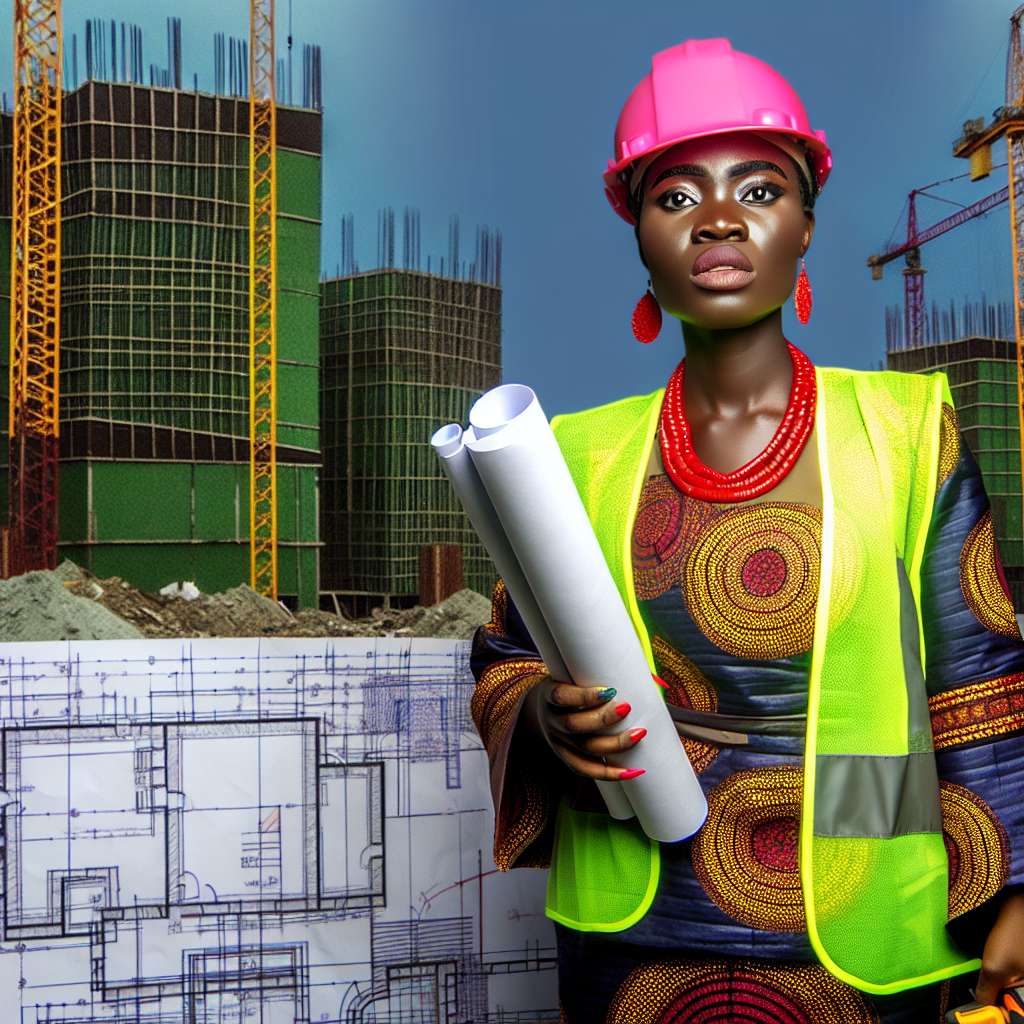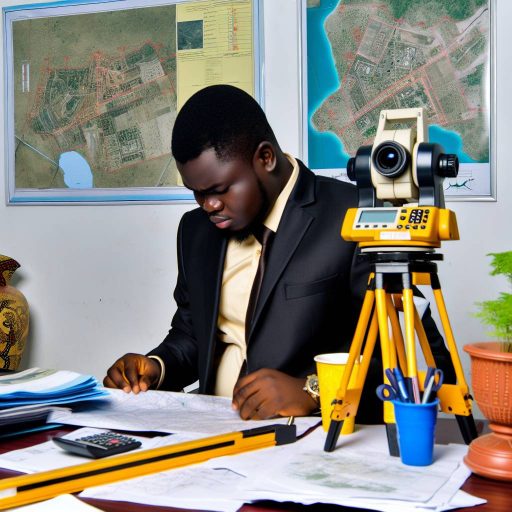Introduction:
In Nigerian structural engineering, women are breaking barriers and redefining the industry.
Despite facing challenges, they have made significant strides in this male-dominated field.
Women in this profession often encounter biases, stereotypes, and limited opportunities compared to their male counterparts.
Addressing these barriers is crucial for achieving gender equality and fostering diversity in engineering.
By highlighting the importance of empowering and supporting women in Nigerian structural engineering, we can create a more inclusive and innovative industry.
Breaking down gender disparities will not only benefit women but also contribute to the overall growth and advancement of the field.
Historical Perspective
Women in Nigeria have historically been excluded from the field of structural engineering.
Pioneering women like Engr. Olufunmilayo Olokode and Engr. Helen Ajayi have made significant contributions.
Societal norms and stereotypes have influenced women’s participation in engineering for decades.
- Women in Nigeria have historically been excluded from the field of structural engineering.
- Pioneering women like Engr. Olufunmilayo Olokode and Engr. Helen Ajayi have made significant contributions.
- Societal norms and stereotypes have influenced women’s participation in engineering for decades.
Current status of women in Nigerian structural engineering:
According to recent data, women represent only 12% of the workforce in structural engineering in Nigeria.
This low representation can be attributed to cultural norms that discourage women from pursuing careers in STEM fields.
Women in Nigerian structural engineering often face challenges such as lack of mentorship and limited opportunities for career advancement.
The lack of female role models in the field makes it difficult for young women to envision themselves thriving in such a male-dominated industry.
Challenges faced by women in Nigerian structural engineering:
One major challenge is the pervasive gender bias that exists within the industry, with women being underestimated and undervalued.
Women often have to work twice as hard to prove themselves and earn the respect of their male counterparts.
Limited access to mentorship and networking opportunities further hinders women’s progress in the field.
The lack of support systems for women in Nigerian structural engineering makes it harder for them to navigate their career paths and overcome obstacles.
Comparison of experiences of women in different sectors of engineering within Nigeria:
Women in civil engineering face similar challenges to those in structural engineering, including lack of representation and gender bias.
However, women in software engineering and information technology tend to have more opportunities for career advancement and mentorship.
This disparity highlights the need for more support systems and initiatives to empower women in structural engineering specifically.
By sharing experiences and strategies across different sectors of engineering, women can work together to break barriers and create a more inclusive industry.
You Might Also Like: Biomedical Engineering Conferences in Nigeria
Initiatives and programs supporting women in engineering:
Many initiatives focus on increasing women’s participation in structural engineering.
Mentorship programs offer guidance and support to female engineers.
Networking opportunities provide connections and resources for aspiring women in engineering.
Successful case studies showcase women who have excelled with program support.
Existing initiatives aimed at increasing women’s participation:
There are various initiatives and programs specifically designed to encourage and support women in the field of structural engineering.
These initiatives aim to break down barriers, promote diversity, and create a more inclusive environment for women in this traditionally male-dominated industry.
Impact of mentorship programs and networking opportunities:
Mentorship programs play a crucial role in the success of aspiring female engineers.
Having access to a mentor who can provide guidance, advice, and support can greatly impact a woman’s career trajectory in engineering.
Networking opportunities also play a key role in connecting women with industry professionals, potential employers, and career advancement opportunities.
Successful case studies of women excelling in the industry:
There are many inspiring case studies of women who have excelled in the field of structural engineering with the help of support programs.
These women have overcome challenges, shattered stereotypes, and made significant contributions to the industry.
Their success stories serve as motivation for other women and demonstrate the importance of support programs in achieving gender equality in engineering.
Initiatives and programs supporting women in engineering are essential for increasing diversity, promoting gender equality, and ensuring that women have equal opportunities to succeed in the field of structural engineering.
Learn More: Pest Control Technologies in Agricultural Engineering
Educational Opportunities for Women in Engineering:
Breaking barriers for women in Nigerian structural engineering requires a strong foundation in education and exposure to STEM fields from an early age.
Importance of early education and exposure to STEM fields:
- Introducing girls to STEM subjects early on can spark their interest in engineering.
- Providing access to resources and role models can inspire girls to pursue careers in engineering.
- Encouraging hands-on learning experiences can help girls develop problem-solving skills and confidence in their abilities.
Scholarships, grants, and fellowships for female engineering students:
- Organizations like the Society of Women Engineers offer scholarships specifically for women in engineering.
- Nigerian universities and government agencies also provide funding opportunities for female engineering students.
- Strategic partnerships with industry leaders can create additional scholarship opportunities for aspiring female engineers.
Role of universities and professional organizations in promoting diversity and inclusion:
Transform Your Career with Expert Guidance
Get personalized mentorship consulting that’s tailored to your unique path. Our expert advice is actionable and exclusive.
Get Started- Universities can establish mentorship programs to support female engineering students throughout their academic journey.
- Professional organizations can provide networking opportunities and career development resources for women in engineering.
- Collaborating with industry partners can create internships and co-op programs that offer real-world experience for female engineering students.
By investing in educational opportunities and support systems for women in engineering, Nigeria can empower a new generation of female structural engineers who will continue to break barriers and drive innovation in the field.
Delve into the Subject: Understanding Land Surveying Regulations in Nigeria

Addressing workplace challenges:
Women in Nigerian structural engineering face numerous barriers in the workplace.
These challenges hinder their professional growth and success.
Barriers include bias, discrimination, and a lack of representation in leadership roles.
Barriers faced by women in the workplace:
- Bias: Women often encounter bias based on gender stereotypes that undermine their abilities and contributions.
- Discrimination: Women may face discrimination in terms of promotions, salary disparities, and opportunities for advancement.
- Lack of representation in leadership roles: Women are underrepresented in leadership positions, limiting their influence and decision-making power.
Strategies for creating an inclusive work environment:
- Implement diversity and inclusion training programs to educate employees about unconscious bias and promote a more inclusive culture.
- Establish mentorship and sponsorship programs to support female engineers in their career development and provide opportunities for growth.
- Promote transparency and accountability in hiring and promotion processes to ensure equal opportunities for all employees.
Benefits of diversity in engineering teams:
- Diverse teams bring different perspectives and ideas to the table, leading to innovation and creative problem-solving.
- Gender equality in decision-making processes ensures that a wide range of voices are heard, leading to more well-rounded and effective solutions.
- Creating a supportive work environment for female engineers enhances overall team morale and productivity, contributing to the success of the organization.
By addressing these workplace challenges, organizations can foster a more inclusive and supportive environment for women in Nigerian structural engineering.
This can unlock the full potential of their teams and drive innovation and growth in the industry.
Discover More: Challenges Facing Mechatronics Engineers in Nigeria
Breaking stereotypes and changing perceptions:
- Exploring the stereotypes that hinder women’s progress in structural engineering
- Discussing the role of media, education, and advocacy in challenging these stereotypes
- Sharing success stories of women who have excelled in the field of engineering
Breaking stereotypes and changing perceptions are crucial steps towards achieving gender equality in the field of structural engineering.
Women have long faced biases and prejudices that hinder their progress in the industry.
These stereotypes often lead to a lack of representation, unequal opportunities, and limited growth for women in engineering.
One of the main stereotypes that women in structural engineering face is the misconception that they are not as capable as their male counterparts.
This bias is deeply ingrained in society and has been perpetuated by years of gender norms and expectations.
Women are often underestimated and undervalued in the field, which creates barriers to their success.
Media plays a significant role in shaping societal perceptions of women in engineering.
Many movies, TV shows, and advertisements portray engineers as male, reinforcing the idea that women do not belong in this field.
This lack of representation in the media can discourage young girls from pursuing careers in engineering and perpetuate stereotypes about the lack of female engineers.
Education is another key factor in challenging stereotypes and biases against women in structural engineering.
By providing equal education opportunities for both genders and promoting STEM subjects to young girls, we can create a more inclusive and diverse field.
Encouraging girls to pursue interests in engineering from a young age can help break down stereotypes and foster a new generation of female engineers.
Advocacy also plays a crucial role in breaking stereotypes and promoting gender equality in structural engineering.
By advocating for policies that support women in the workplace, such as equal pay and mentorship programs, we can create a more supportive environment for women to thrive.
Advocacy groups and organizations can also raise awareness about the importance of diversity in engineering and challenge societal norms that hold women back.
Despite the challenges and stereotypes they face, many women have overcome societal expectations and excelled in the field of engineering.
By sharing their success stories and achievements, we can inspire future generations of female engineers and show that gender should not be a barrier to success.
These women serve as role models and trailblazers, breaking down barriers and paving the way for a more inclusive and diverse engineering industry.
Women Breaking Barriers in Structural Engineering
Women in Nigerian structural engineering are breaking barriers.
They are making significant strides in a male-dominated field.
With determination and resilience, these women are challenging stereotypes.
They are reshaping the industry in profound ways.
The importance of breaking barriers for women in this field cannot be overstated.
By promoting gender equality and diversity, we create a better environment.
This culture benefits everyone involved in the industry.
Support for Female Engineers
It is crucial for stakeholders to support female engineers.
Empowering them in their pursuit of gender equality is essential.
By providing resources, mentorship, and opportunities, we can help.
This support cultivates strong and successful women in the field.
Additional Resources
Somalian Women engineers break barriers amid construction boom …




